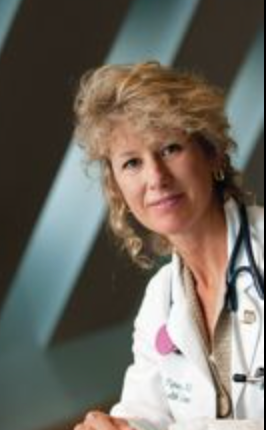Hospitals Are Building Well-Being Programs to Address Burnout, but Efforts Vary Widely
For programs to flourish, hospitals must invest resources and training, experts said. A panel at AAMC’s annual conference talked about strategies for success.
Hospital staff are wrestling with more stress and burnout due to the COVID-19 pandemic, and many hospitals have launched programs to monitor the well-being of their workers.
However, efforts to address employee well-being vary widely at hospitals, according to proponents for such programs. At the Association of American Medical Colleges annual conference Wednesday, a panel discussed those efforts and highlighted strategies to build programs to keep staff healthy.
Critically, the panelists said hospital leadership must recognize the importance of well-being programs. Repeatedly, those on the panel talked about the need for funding, time and training for those people charged with leading wellness programs.
Catherine Florio Pipas

“We see people are being named well-being champions. Tag, you’re it,” said Catherine Florio Pipas, a professor of community and family medicine at the Dartmouth Institute. But often, those individuals tasked with leading well-being programs aren’t properly supported.
A recent AAMC survey shed light on the expansion of well-being programs at hospitals. The survey found nearly 90% said they had well-being programs in place, but the scope of those initiatives varies greatly.
About half of wellness directors said they were allocated about one-third of their time to that role. But the panelists said many of those well-being champions aren’t specifically designated work time for that role.
Only about 30% of well-being champions said they had received any training. The majority of well-being programs either weren’t funded or were financed on the basis of demonstrating a return on investment, the AAMC survey found.
Serina A. Neumann, a clinical psychologist at the Hampton VA Medical Center, led the development of the well-being program at that facility.
Neumann created a centralized wellness committee and worked with members to assess needs, develop a wellness curriculum and implement events and peer-to-peer programs. She stressed the importance of collecting data on well-being to help drive institutional change.
Healthcare systems and academic medical centers need to consider family leave programs, said Mona M. Abaza, professor and vice chair of faculty affairs and diversity for the department of otolaryngology at the University of Colorado School of Medicine. She noted too little is done to allow residents to deal with major life events.
There is growing recognition of allowing family leave for residents, Abaza said. In July, the American Board of Medical Specialties said its member boards will allow a minimum of six weeks of leave for those in training programs lasting two years or more. The family leave, for events such as childbirth or caring for a loved one, won’t require the exhaustion of vacation time or sick leave.
Panelists talked about securing buy-in for well-being programs from hospital administrators. Jon A. Courand, professor and vice chair of graduate medical education for pediatrics at UT Health San Antonio, is also the assistant dean for well-being for graduate medical education. He discussed the importance of engaging hospital CEOs, deans and other administrators to build organizational support.
But Abaza said much of the change may be spurred by staff, including residents who aren’t going to work at facilities without family leave programs.
“We're going to need our learners to lead us from below,” Abaza said. She added young physicians “will not tolerate the pressures we’ve created.”
Healthcare systems should consider appointing well-being champions to oversee programs at the organizational level, Pipas said. Hospital systems also should embed well-being champions at institutions throughout the organization.
Hospital systems must provide funding, resources and training of those charged with improving wellness at their institutions, Pipas said. And panelists discussed the need for ongoing assessments of individual well-being.
Pipas also said hospital systems need to help healthcare professionals to think of their well-being as an integral part of their jobs. ‘‘We need well-being to be a core competency for everyone,” Pipas said.
“We need to be able to prioritize well-being as a professional development goal,” she added.
Children’s hospitals face complex challenges dealing with disasters
April 18th 2025Pediatric hospitals deal with different factors in weather-related events and other emergencies. Terri Wilson of the Children’s Hospital Association talks about the challenges and the need for more planning and support.